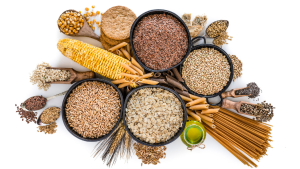
Maintain a Healthy Lifestyle by Controlling Weight.
Controlling weight involves a combination of healthy eating, regular physical activity, and healthy lifestyle choices. Here are some general tips to help you manage your weight:
Balanced Diet for Healthy Lifestyle:

A balanced diet is essential for maintaining good health and achieving proper nutrition for a healthy lifestyle. It involves consuming various foods from different food groups in the right proportions to meet your body's nutritional needs. Here are the key components of a balanced diet:
Fruits and Vegetables:

- Aim to fill half your plate with a variety of colorful fruits and vegetables. These foods provide essential vitamins, minerals, antioxidants, and fiber for a healthy lifestyle.
Whole Grains:

- Choose whole grains over refined grains. Whole grains like brown rice, quinoa, oats, and whole wheat bread contain more nutrients and fiber, providing sustained energy.
Protein Sources:

- Include a variety of protein sources in your diet, such as lean meats, poultry, fish, eggs, dairy products, legumes, nuts, and seeds. Protein is crucial for muscle development, repair, and overall body function for a healthy lifestyle.
Dairy or Dairy Alternatives:

- Include dairy products like milk, yogurt, and cheese, or suitable alternatives like fortified plant-based milk. These provide calcium for bone health and other essential nutrients for a healthy lifestyle.
How to Cultivate Mushroom?
Healthy Fats:

- Incorporate sources of healthy fats, such as avocados, nuts, seeds, and olive oil. These fats are important for brain function, hormone production, and overall cell health.
Limit Saturated and Trans Fats:

- Reduce the intake of saturated and trans fats found in fried foods, processed snacks, and certain oils. Opt for healthier cooking methods like baking, grilling, or steaming.
Limit Added Sugars for a healthy lifestyle:

- Minimize the consumption of foods and beverages with added sugars. This includes sugary drinks, candies, and processed snacks. Instead, choose natural sources of sweetness like fruits.
Hydration:

- Drink an adequate amount of water throughout the day. Water is essential for digestion, nutrient absorption, and overall body function. Herbal teas and infused water can also be good alternatives for a healthy lifestyle.
Portion Control:

- Be mindful of portion sizes to avoid overeating. Listen to your body's hunger and fullness cues, and try to avoid eating large portions, especially when not hungry.
Vitamins and Minerals:

- Ensure that your diet includes a variety of foods to cover all essential vitamins and minerals for a healthy lifestyle. If needed, consider supplementation under the guidance of a healthcare professional.
Dietary Fiber:

- Include plenty of fiber-rich foods like whole grains, fruits, vegetables, legumes, and nuts. Fiber aids digestion, helps maintain a healthy weight, and can contribute to lower cholesterol levels.
Regular Exercise:

Regular exercise is a crucial component of a healthy lifestyle and plays a significant role in maintaining physical and mental well-being. Here are key aspects of incorporating regular exercise into your routine:
Choose Activities You Enjoy:
- Opt for activities that you find enjoyable, whether it's walking, running, cycling, swimming, dancing, or playing a sport. This increases the likelihood that you'll stick with your exercise routine.
Set Realistic Goals:
- Establish achievable, realistic fitness goals. Whether it's increasing your daily step count, running a certain distance, or lifting a specific weight, setting attainable goals helps track progress and keeps you motivated.
Aerobic Exercise (Cardio):
- Include aerobic exercises to improve cardiovascular health and burn calories for a healthy lifestyle. Aim for at least 150 minutes of moderate-intensity aerobic activity or 75 minutes of vigorous-intensity activity per week.
Strength Training:
- Integrate strength training exercises at least two days a week. This can involve lifting weights, using resistance bands, or doing bodyweight exercises. Strength training helps build and maintain muscle mass, which contributes to overall metabolic health.
Flexibility and Balance:
- Include flexibility and balance exercises in your routine. Activities like yoga or tai chi can enhance flexibility, balance, and posture, reducing the risk of injuries and improving overall well-being.
Consistency is Key:
- Make exercise a regular part of your routine. Consistency is more important than intensity. Even shorter, more frequent sessions are beneficial.
Start Slowly:
- If you're new to exercise or returning after a break, start with low-intensity activities and gradually increase the duration and intensity. This helps prevent injuries and allows your body to adapt.
Mix It Up:
- Avoid monotony by incorporating a variety of exercises into your routine for a healthy lifestyle. This not only prevents boredom but also ensures that different muscle groups are engaged.
Rest and Recovery:
- Allow time for rest and recovery. Your body needs time to repair and build stronger muscles. Overtraining can lead to fatigue and an increased risk of injury.
Listen to Your Body:
- Pay attention to how your body responds to exercise. If you experience pain or discomfort, it's important to address it and modify your exercise routine as needed. Consult a healthcare professional if you have any concerns for a healthy lifestyle.
Stay Hydrated:
- Drink water before, during, and after exercise to stay hydrated. Proper hydration is essential for optimal physical performance.
Warm-Up and Cool Down:
- Always include a warm-up and cool-down in your exercise routine. This helps prepare your body for physical activity and promotes flexibility.
Hydration for a healthy lifestyle:

Hydration is crucial for overall health and well-being for a healthy lifestyle. Water plays a vital role in various bodily functions, and maintaining proper hydration is essential for optimal physical and mental function. Here are some important aspects of hydration:
Daily Water Intake:
- The amount of water a person needs can vary based on factors such as age, sex, weight, activity level, and climate. As a general guideline, aim for about 8 cups (64 ounces) of water per day, but individual needs may vary.
Thirst Response:
- Listen to your body's signals. Thirst is a natural indicator that your body needs water. Drink water when you feel thirsty, and try to avoid waiting until you're extremely thirsty.
Climate and Activity Level:
- Hot and humid weather, as well as increased physical activity, can lead to higher fluid loss through sweat. In such conditions, it's important to increase water intake to prevent dehydration for a healthy lifestyle.
Balanced Fluids for a healthy lifestyle:
- While water is the best choice for staying hydrated, other beverages like herbal teas and infused water can contribute to your daily fluid intake. Limit the consumption of sugary drinks and caffeinated beverages, as excessive caffeine and sugar can have diuretic effects.
Monitor Urine Color:
- The color of your urine can be an indicator of hydration status. Pale yellow or straw-colored urine usually indicates proper hydration, while dark yellow or amber urine may suggest dehydration.
Hydrate Before, During, and After Exercise:
- Drink water before, during, and after physical activity. The American Council on Exercise recommends drinking 17-20 ounces of water 2 hours before exercising, 8 ounces 20-30 minutes before, 8 ounces every 10-20 minutes during exercise, and 8 ounces within 30 minutes after exercising.
Hydrate in the Morning:
- Start your day by drinking a glass of water for a healthy lifestyle. After a night of sleep, your body can be in a mildly dehydrated state, and drinking water in the morning helps kickstart hydration.
Include Hydrating Foods:
- Some foods, especially fruits and vegetables, have high water content and contribute to your overall fluid intake. Watermelon, cucumber, celery, oranges, and strawberries are examples of hydrating foods.
Special Considerations:
- Pregnant and breastfeeding women, older adults, and individuals with certain health conditions may have specific hydration needs. Consult with a healthcare professional for personalized advice.
Hydration and Illness:
- During illnesses that involve fever, vomiting, or diarrhea, the body can lose fluids rapidly. In such cases, it's important to replenish fluids to prevent dehydration for a healthy lifestyle.
Details on “Creating Ficus Retusa Bonsai”.
Sleep:

Sleep is a fundamental aspect of overall health and well-being for a healthy lifestyle. Quality sleep is essential for physical and mental function, and it plays a crucial role in various physiological processes. Here are key aspects of sleep and tips for promoting a healthy sleep routine:
Consistent Sleep Schedule:
- Go to bed and wake up at the same time every day, even on weekends. This helps regulate your body's internal clock and improves the quality of your sleep.
Create a Relaxing Bedtime Routine:
- Develop a calming routine before bedtime to signal to your body that it's time to wind down. This could include activities like reading a book, taking a warm bath, or practicing relaxation exercises.
Comfortable Sleep Environment:
- Ensure that your bedroom is conducive to sleep. This includes a comfortable mattress and pillows, as well as a cool, dark, and quiet environment. Consider using blackout curtains and white noise machines if needed.
Limit Exposure to Screens Before Bed:
- The blue light emitted by electronic devices like phones, tablets, and computers can interfere with the production of the sleep hormone melatonin. Aim to limit screen time to at least an hour before bedtime.
Watch Your Diet:
- Avoid large meals, caffeine, and nicotine close to bedtime. These can disrupt sleep and make it harder to fall asleep.
Regular Exercise for a healthy lifestyle:
- Engage in regular physical activity, but try to finish exercising at least a few hours before bedtime. Exercise promotes better sleep, but doing it too close to bedtime can have the opposite effect.
Limit Naps:
- If you need to nap during the day, keep it short (20-30 minutes) and avoid napping too close to bedtime. Long or late afternoon naps can interfere with nighttime sleep.
Manage Stress:

- Practice stress-reducing techniques, such as deep breathing, meditation, or yoga. Managing stress can contribute to a more restful sleep.
Be Mindful of Alcohol:

- While alcohol may initially make you feel sleepy, it can disrupt the later stages of sleep and lead to fragmented or poor-quality sleep. Limit alcohol intake, especially close to bedtime.
Cognitive Behavioral Therapy for Insomnia (CBT-I):
- If you struggle with persistent sleep difficulties, consider seeking help from a healthcare professional, such as a sleep specialist or therapist trained in CBT-I. Cognitive-behavioral therapy is effective in treating insomnia.
Limit Stimulants:
- Be mindful of substances that can interfere with sleep, such as stimulants like certain medications or recreational drugs. Consult with a healthcare professional if you have concerns about how substances may be affecting your sleep.
Listen to Your Body:
- Pay attention to your body's natural sleep-wake cycle. If you consistently get sleepy and wake up at the same time, try to align your sleep schedule accordingly.
Mindful Eating for a healthy lifestyle:
Mindful eating is a practice that involves paying full attention to the experience of eating, savoring each bite, and being fully present in the moment. This approach can contribute to healthier eating habits, better digestion, and improved overall well-being. Here are some tips for practicing mindful eating:
Eat Without Distractions:
- Avoid eating in front of the TV, computer, or while scrolling through your phone. Create a dedicated space for meals, and focus on the sensory experience of eating.
Appreciate Your Food:
- Take a moment to appreciate the colors, textures, and aromas of your food. Notice the flavors and how each bite makes you feel.
Chew Slowly and Thoroughly:
- Chew your food slowly and savor each bite. This not only enhances the taste but also allows your body to recognize when it's satisfied, helping to prevent overeating.
Listen to Your Body:
- Pay attention to hunger and fullness cues. Eat when you're hungry and stop when you're satisfied. This requires tuning in to your body's signals rather than following external cues or finishing a meal out of habit.
Check-in with Emotions:
- Be aware of your emotional state before and during meals. Are you eating out of hunger, boredom, stress, or habit? Mindful eating involves understanding the emotional aspects of your relationship with food.
Portion Control for a healthy lifestyle:
- Use smaller plates and serve smaller portions for a healthy lifestyle. This can help prevent mindless overeating and encourage you to savor each bite.
Express Gratitude:
- Take a moment to express gratitude for your food. Consider the effort that went into growing, preparing, and serving the meal.
Pause Between Bites:
- Put your utensils down between bites. This simple act helps you slow down and become more aware of the process of eating.
Be Mindful of Snacking:

- If you're snacking, do it consciously. Avoid mindlessly munching on snacks while engaged in other activities. Instead, take a break and savor the snack.
Understand Food Choices:
- Consider the nutritional value of the food you're eating. Choose foods that nourish your body and provide the energy you need.
Be Non-Judgmental:
- Avoid labeling foods as "good" or "bad." Allow yourself to enjoy a variety of foods without guilt. Mindful eating is about fostering a positive and non-judgmental relationship with food.
Practice Gratitude:
- Take a moment to appreciate the effort that went into preparing your meal, and express gratitude for the nourishment it provides.
Regular Meals:

Eating regular, balanced meals throughout the day is an important aspect of maintaining good health and supporting overall well-being. Here are some key tips for incorporating regular meals into your routine for a healthy lifestyle:
Establish a Meal Schedule:

- Plan your meals and snacks at regular intervals throughout the day. Aim for three main meals (breakfast, lunch, and dinner) with healthy snacks as needed.
Eat Breakfast:
- Start your day with a nutritious breakfast. This helps kickstart your metabolism and provides energy for the day ahead.
Include a Variety of Foods:
- Ensure that each meal includes a mix of macronutrients (carbohydrates, proteins, and fats), as well as a variety of vitamins and minerals. This promotes balanced nutrition.
Don't Skip Meals:
- Avoid skipping meals, as this can lead to overeating later in the day.
https://livewithgreen.com/healthy-lifestyle-by-controlling-weight/
.jpg)